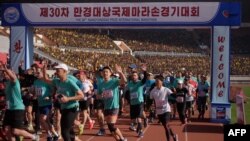Twice as many foreigners as last year gathered in Pyongyang Sunday for the city's annual marathon, tour firms said, as reduced tensions see visitor numbers rise in isolated North Korea.
The event -- part of the celebrations for the anniversary of founder Kim Il Sung's birth in 1912 -- is the highlight of the North's tourism calendar and offers the chance to run or jog through the streets of the tightly controlled city.
Around 950 Westerners entered the event, according to market leader Koryo Tours, compared to some 450 last year when numbers slumped.
That brought participation almost back to the levels of 2017, before tensions soared as the North carried out a series of missile launches and leader Kim Jong Un traded threats and personal insults with U.S. President Donald Trump.
The same year, Washington also banned its citizens from visiting the North following the death of Otto Warmbier, a U.S. student jailed for trying to steal a propaganda poster who died in a mysterious coma days after his release.
Several other countries subsequently raised their travel warnings, a combination of events that dealt a significant blow to the North's tourism industry.
The U.S. ban remains in place but more Western tourists signed up for the marathon this time, tour operators said, following a year of high-level diplomacy between Trump and Kim.
"As political tensions have subsided, tourism demand has increased," said Elliott Davies, director at Uri Tours, another operator, adding: "You could plot a graph in this direct relationship."
'Marathon chasers'
The vast majority of tourists to the North are Chinese and some 5,000 Westerners a year used to visit the North -- with about 20 percent of those from the U.S. -- seeking unique adventures in one of the most closed countries in the world.
The annual race also attracts so-called "Marathon Chasers" who tick off runs around the world, said Matt Kulesza, a senior tour guide at Young Pioneer Tours.
Angel Arnaudov, a 34-year-old engineer from Macedonia, said Pyongyang came onto his "radar" after finishing more than 30 marathons in cities ranging from Tokyo, New York and Copenhagen.
"I want to experience the life in North Korea myself and see if it is like they say on TV or different," he said, adding he would be posting videos on his YouTube channel.
For third-time participant Jasmine Barrett, the Pyongyang Marathon was an opportunity to interact with ordinary North Koreans who line the streets to cheer on the runners, offering high-fives and posing for selfies.
"I keep coming back because I love to see the smiles on the children's faces," the Australian entrepreneur told AFP.
"I'd definitely recommend it to others because it's a great way to see the city and the people who live there," she added.
Tour operators advise visitors to take extra precautions about "what to do and what not to do" when traveling in the North.
Simon Cockerell, Koryo Tours' general manager, said: "This is vital when visiting North Korea and anyone wanting to travel shouldn't go without a briefing."




